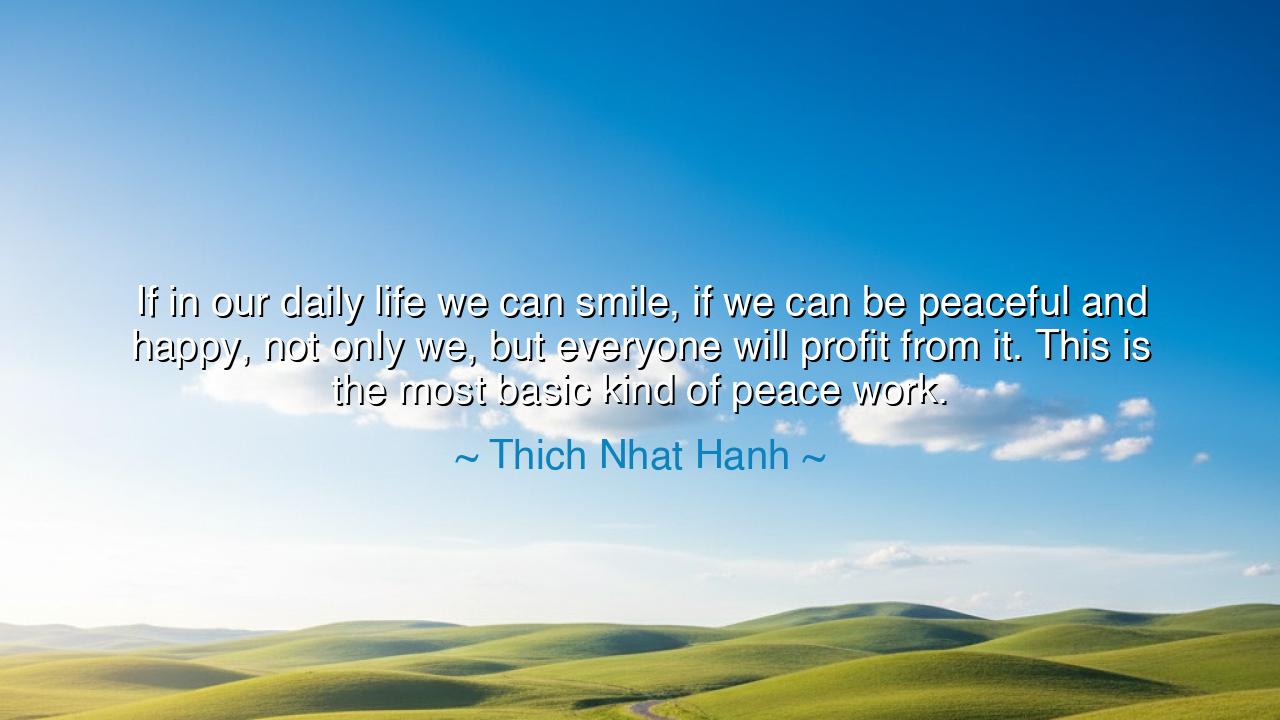
If in our daily life we can smile, if we can be peaceful and
If in our daily life we can smile, if we can be peaceful and happy, not only we, but everyone will profit from it. This is the most basic kind of peace work.






Hear the gentle but thunderous teaching of Thich Nhat Hanh, the monk of Vietnam, who carried peace in his steps and light in his breath: “If in our daily life we can smile, if we can be peaceful and happy, not only we, but everyone will profit from it. This is the most basic kind of peace work.” Do not be deceived by the simplicity of these words, for within them lies a wisdom more enduring than kingdoms and more transformative than armies. They reveal the secret that the foundation of peace in the world is not grand declarations, but the serenity of a single soul who knows how to smile.
For what is it to smile? It is to reveal harmony between the inner heart and the outer world. A smile is the sun of the face, and when genuine, it is a gift that shines upon all who see it. Thich Nhat Hanh reminds us that this small act, when joined with peacefulness and happiness, is no trivial thing—it is the seed of peace work. Wars are born in the hearts of men through anger, greed, and fear. But if the heart can cultivate joy and serenity in daily life, then the soil where hatred grows is made barren.
The ancients knew this truth, though they spoke it in their own tongue. Laozi, the sage of the Tao, taught that the world is transformed not by striving and force, but by harmony with the Way, by gentleness that bends but does not break. In the same spirit, Thich Nhat Hanh proclaims that true peace work begins not in the council chambers of nations, but in the kitchen, in the garden, in the marketplace, wherever one can breathe deeply, smile sincerely, and bring calm into the lives of others.
Consider the story of Mahatma Gandhi. He led a movement against the might of an empire, not with swords but with simplicity, with discipline, and with a radiant serenity that spread like fire among his people. Gandhi’s peace work began not only in marches and fasts, but in his daily conduct—in the way he greeted others, in the joy with which he lived. His smile carried as much strength as his words, for it proved that peace was not an idea, but a way of being. Through this, millions were transformed.
Thich Nhat Hanh himself lived this truth. Exiled from his homeland during war, he might have chosen anger or despair. Instead, he walked gently, teaching others to find peace within themselves even as bombs fell upon their villages. His smile was not born of naivety, but of profound understanding: that hatred cannot be defeated by more hatred, only by compassion. Thus he taught that to be peace is to make peace—that one calm and joyful person radiates healing into the world.
This is the meaning of “the most basic kind of peace work.” It is the reminder that change does not begin in distant halls of power, but in the way we live this very moment. A calm heart at the dinner table is already peace work. A kind word in the marketplace is already peace work. A smile offered to a stranger may heal more than a speech shouted in anger. From these small acts, larger ripples of peace spread outward, touching family, community, and beyond.
Therefore, O listener, take this wisdom into your life: practice smiling each day—not as pretense, but as a conscious act of peace. Cultivate moments of stillness, where your breath becomes steady and your mind quiet. Share your happiness freely, not only in times of triumph, but also when burdens press heavy upon you. In doing so, you create an atmosphere where others may also breathe, rest, and find peace. This is not weakness, but the deepest form of strength.
Thus, Thich Nhat Hanh’s words resound as a call across the generations: do not wait for the world to give you peace—be peace yourself. Live with serenity, smile with sincerity, and let your daily actions be your protest against hatred. For if each heart learns this most basic of arts, the world itself will be transformed.






AAdministratorAdministrator
Welcome, honored guests. Please leave a comment, we will respond soon